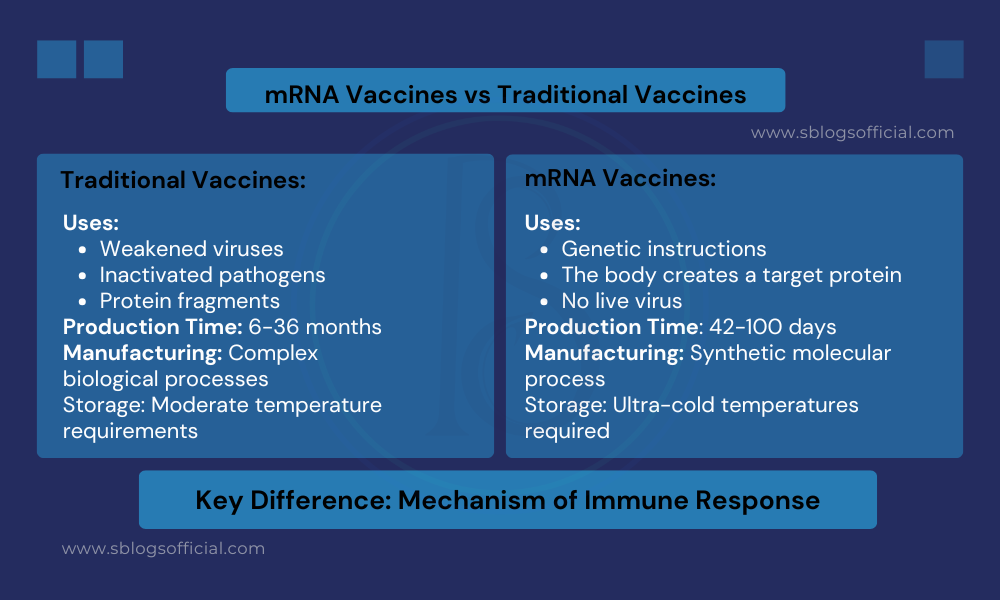
Imagine a medical technology so ingenious that it can essentially reprogram your body’s cellular machinery to fight diseases in ways we never thought possible. mRNA vaccines represent more than just a scientific breakthrough – they’re a glimpse into a future where medicine is personalised, precise, and remarkably adaptive. From potentially transforming cancer treatment to offering rapid responses to emerging infectious diseases, this revolutionary technology is rewriting the rules of medical intervention. It’s not just about creating vaccines; it’s about empowering the human body to become its own most sophisticated defence mechanism.
Understanding mRNA Vaccines: The Basics
mRNA (messenger RNA) vaccines represent a cutting-edge approach to immunisation that’s quite different from traditional vaccine methods. Instead of introducing a weakened or inactivated pathogen into your body, these clever vaccines work by giving your cells precise instructions to create a specific protein that triggers an immune response.
Think of mRNA vaccines like a set of microscopic instructions – they’re essentially teaching your body’s cells how to recognise and fight specific diseases, almost like training an elite defence force within your immune system.
Also read- High-Level Meeting on Antimicrobial Resistance | Global Challenge
What Are the Future Uses of mRNA Vaccines?
The potential of mRNA vaccines extends far beyond our current understanding, opening up exciting possibilities for medical treatment and prevention. Researchers around the globe are exploring how this technology could transform healthcare, moving from a reactive to a proactive approach to fighting diseases. The flexibility and adaptability of mRNA technology suggest we’re on the cusp of a medical breakthrough that could revolutionise how we approach everything from infectious diseases to genetic disorders. Imagine a world where personalised medical treatments can be developed rapidly, targeting specific health challenges with unprecedented precision and effectiveness.
The future of mRNA technology is incredibly exciting. Researchers are exploring its potential to combat:
- Cancer treatments
- HIV prevention
- Influenza variants
- Rare genetic disorders
- Personalised medicine approaches
Scientists believe mRNA technology could be a game-changer in creating targeted, rapid-response vaccines for emerging diseases. Imagine being able to develop a vaccine in weeks instead of years!
Applications of mRNA Vaccines Beyond Infectious Diseases
The realm of medical science is witnessing a remarkable transformation, with mRNA technology promising to break down traditional barriers in treatment approaches. This innovative method goes beyond simply preventing diseases, offering potential solutions for conditions that have long challenged medical professionals. The interdisciplinary nature of mRNA research brings together experts from genetics, immunology, and molecular biology, creating a collaborative approach to solving complex medical challenges. As our understanding deepens, we’re beginning to see how this technology could potentially rewrite the rules of medical intervention.
Cancer Immunotherapy
One of the most promising applications is in cancer treatment. mRNA vaccines could potentially:
- Train the immune system to recognise and attack cancer cells
- Create personalised treatments based on individual tumour characteristics
- Provide a more precise and less invasive treatment option
Researchers are already conducting clinical trials exploring how mRNA technology might help treat various types of cancer, offering hope for more effective and personalised cancer therapies.
Also Read- FLiRT COVID Variants | Latest Update for December 2024
Advances in mRNA Vaccine Technology
Scientific innovation rarely stands still, and mRNA vaccine technology is a perfect example of rapid, transformative progress. The past few years have seen unprecedented advancements that have pushed the boundaries of what we thought possible in medical research. These developments are not just incremental improvements but fundamental shifts in our approach to vaccine development and medical treatment. Researchers are working tirelessly to refine the technology, addressing challenges and expanding its potential applications with each breakthrough.
Technological Breakthroughs
Recent advances have dramatically improved mRNA vaccine capabilities:
- Enhanced stability of mRNA molecules
- More efficient delivery mechanisms
- Reduced side effects
- Faster production times
- Ability to target multiple disease targets simultaneously
These technological improvements mean mRNA vaccines are becoming more versatile, reliable, and potentially transformative in medical science.
Current mRNA Vaccines in Use
The journey of mRNA vaccines from a theoretical concept to a practical medical solution is nothing short of extraordinary. What began as a promising area of research has quickly transformed into a real-world tool that has saved millions of lives during the global pandemic. This rapid transition demonstrates the incredible potential of scientific research when resources, expertise, and urgent need align. The success of mRNA vaccines has not only provided immediate protection but has also opened up new avenues for future medical innovations.
Approved Vaccines
As of now, the most well-known mRNA vaccines include:
- Pfizer-BioNTech COVID-19 vaccine
- Moderna COVID-19 vaccine
These vaccines demonstrated remarkable efficacy during the global pandemic, proving the potential of mRNA technology on a worldwide stage.
Also Read- Game-Changing Medical Breakthroughs 2024
Why mRNA Vaccines Differ from Traditional Vaccines
The landscape of vaccine development is undergoing a profound transformation, with mRNA technology challenging long-established paradigms. While effective, traditional vaccine methods have inherent limitations that this new approach seeks to overcome. By fundamentally changing how we stimulate immune responses, mRNA vaccines represent more than just a new type of vaccine – they symbolise a shift in our understanding of how the human body can be prompted to protect itself. This revolutionary approach combines cutting-edge molecular biology with our deepening understanding of the immune system.

Let’s compare the traditional and mRNA vaccines to look into the innovative approach to immunisation.
| Innovative Approach to Immunisation | |
| Traditional vaccines | mRNA vaccines |
| Weakened pathogens | Provide direct genetic instructions |
| Inactivated viruses | Can be developed much faster |
| Protein fragments | Offer more precise immune system targeting |
| Require less complex manufacturing processes | |
Advantages of mRNA Vaccines
The promise of mRNA vaccines extends far beyond their immediate application, representing a potentially transformative approach to medical treatment. These vaccines embody the intersection of advanced technology, molecular biology, and medical innovation. By offering a more flexible, rapid, and precise method of generating immune responses, they challenge traditional medical approaches and open up exciting possibilities for future healthcare strategies. The advantages go beyond mere technical improvements, suggesting a fundamental reimagining of how we prevent and treat diseases.
Key Benefits
- Rapid Development: Can be designed and produced much quicker than traditional vaccines
- Precision Targeting: Extremely specific immune responses
- Adaptability: Can be quickly modified for new variants
- Lower Production Risks: No live viruses are involved
Potential Challenges and Considerations
While mRNA vaccine technology represents an incredible leap forward, scientific progress is never without its challenges. Researchers and medical professionals are committed to rigorously examining every aspect of this innovative approach, ensuring both its effectiveness and safety. The scientific community understands that breakthrough technologies require careful, systematic evaluation and continuous improvement. These challenges are not obstacles but opportunities for further refinement and understanding.
Understanding Limitations
While promising, mRNA vaccines also face some challenges:
- Current storage requirements (some need ultra-cold temperatures)
- Potential short-term side effects
- Cost of production
- Need for continued research and development
Also Read- Can You Get More Than One Autoimmune Disease?
What Does mRNA Do in the Human Body?
The human body is an incredibly complex system, and mRNA vaccines represent a fascinating way of communicating with our cellular machinery. By understanding how these molecular messengers interact with our cells, we gain insights into the intricate mechanisms of immune response and cellular function. This deeper understanding goes beyond vaccine development, potentially offering new perspectives on how we might address various medical conditions. The study of mRNA’s role in our body is revealing the extraordinary complexity and adaptability of human biology.
The Scientific Mechanism
When an mRNA vaccine enters your body, it:
- Delivers genetic instructions to your cells
- Guides cells to produce a specific protein
- Triggers an immune response
- Helps your body create antibodies
- Prepares your immune system to fight future infections
The Future Landscape of mRNA Technology
We stand at the threshold of a medical revolution, with mRNA technology promising to reshape our approach to healthcare in ways we are only beginning to comprehend. The potential applications stretch across multiple disciplines, from infectious disease prevention to personalised medicine and genetic therapy. This is not just about developing new vaccines, but about fundamentally changing how we understand, prevent, and treat diseases. The collaborative efforts of researchers worldwide are turning what once seemed like science fiction into potential medical reality.
Emerging Possibilities
The potential applications seem almost limitless:
- Combating emerging infectious diseases
- Developing more effective cancer treatments
- Creating personalised medical interventions
- Addressing rare genetic disorders
- Potentially revolutionising preventative medicine
Also Read- Can You Get More Than One Autoimmune Disease?
Conclusion: A New Era of Medical Innovation
mRNA vaccines represent more than just a scientific breakthrough – they’re a glimpse into a future where medicine is more precise, personalised, and powerful. As research continues, we’re likely to see even more incredible developments that could transform healthcare as we know it.
The journey of mRNA technology is just beginning, and the possibilities are truly extraordinary!
Sources-

Thanks for sharing. I read many of your blog posts, cool, your blog is very good.
I’m glad to know you liked it. If you have any queries or would like to share suggestions, please feel free to reach out to us through the contact form. Thank you.